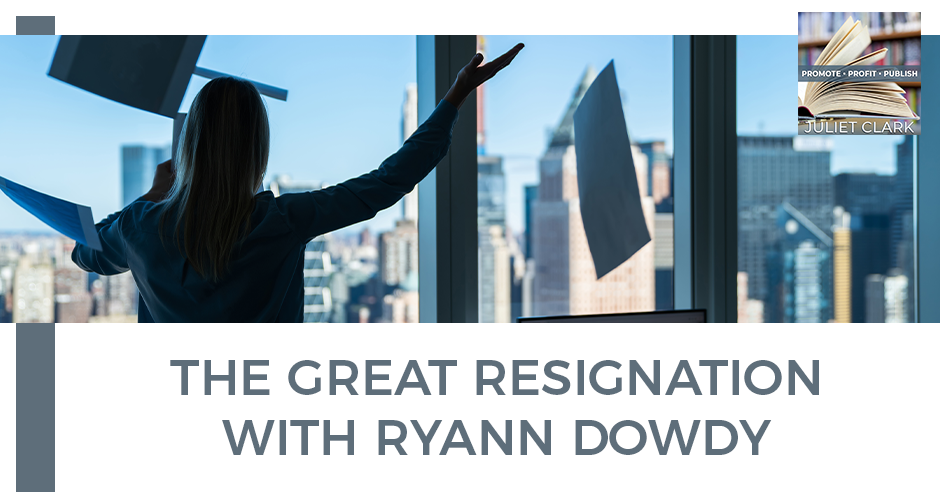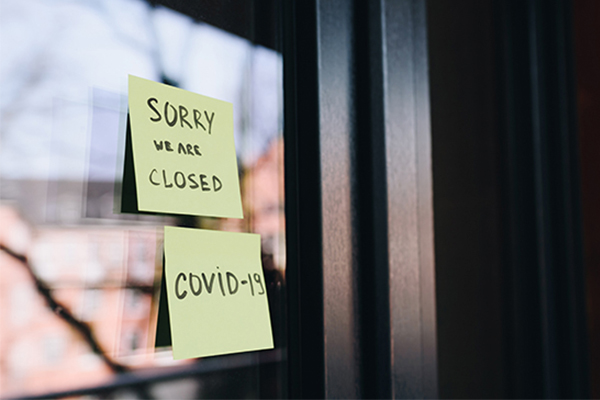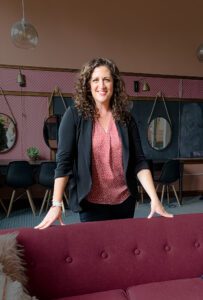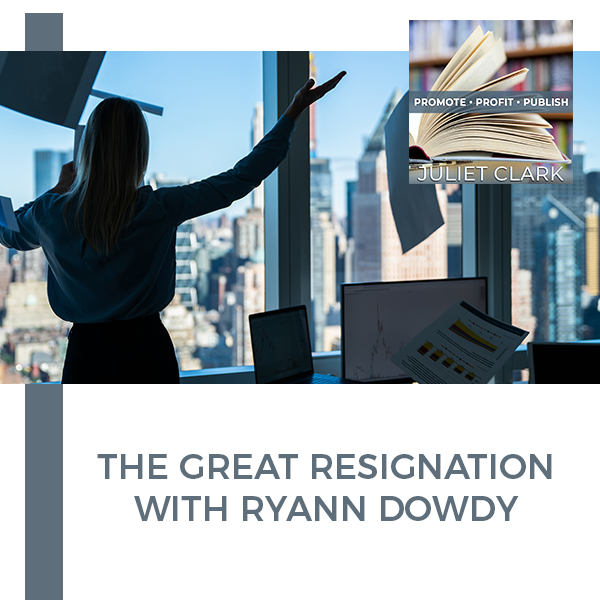
Just last year, the great resignation happened. When COVID-19 hit the world, a record 13 million workers were laid off. Strikingly, the quit rate, especially among women, has dropped even more. With the pandemic giving people time to think about their priorities, a lot decided to venture towards becoming entrepreneurs. Find out why as you join your host Juliet Clark and her guest Ryann Dowdy discuss the great resignation. Ryann is the CEO of Social Sellers Academy. Learn how she became an entrepreneur so that she can regain control of her life. Plus, discover the challenges of being an entrepreneur today!
—
Watch the episode here
Listen to the podcast here
The Great Resignation With Ryann Dowdy
We have a repeat guest, someone who was on earlier in 2021, but we’re going to talk about something that’s a little outside the publishing world but is affecting a lot of you in the business world. Before we get started, I want to remind you to run over to YouTube, subscribe to us Super Brand Publishing. You can see all of the videos from these shows.
Don’t forget to take our Promote Profit Publish Quiz at www.PromoteProfitPublishQuiz.com. Find out if you are ready for publishing. Have you put all those pieces in place? I know you’re probably working on the book, but what about an audience? Who’s going to read it? All of this does not happen by chance.
Our guest is Ryann Dowdy. She is a sales expert who helps 7 and 8 figure CEOs generate daily sales on-demand without more of their time by building and training high-performing sales teams. She is passionate about helping successful business owners take back control of the revenue in their business, their time, and their freedom by building a profitable sales team.
With her business partner, Kelly Roach, they are on a mission to free CEOs from the role of the salesperson in their businesses. Before starting her own business, Ryann spent fifteen years in the corporate world building multimillion-dollar sales organizations for startups in the digital marketing and advertising space. From sales rep to individual contributor to Director of Sales, she has mentored, managed, and trained thousands of sales reps.
Her first crack at entrepreneurship was the Uncensored Consulting, where she helped hundreds of women get their first clients, leave their day jobs, and take back control of their lives. By teaching tried and true sales strategies that aren’t dependent on social media or trendy tactics, she focuses on the art of building relationships and human-to-human connection, which is so important about what we’re going to talk about, so thank you.
I’m excited to be here.
We’re going to talk about the great resignation that’s going on. I know for us, it has impacted our business wildly because people are quitting their jobs right and left and decided to be online entrepreneurs at that. We are getting a lot of business from these people who in the past have been a cog in a bigger corporate wheel and now they’re learning everything it takes. Talk about that to us a little bit.
In my first business, I worked with new entrepreneurs and that’s where I started to learn about all of these people leaving the corporate world. This was back in 2017. I live in the world serving women and it was a lot of moms who were like, “I want to contribute financially to my family.” The traditional corporate environment did not allow them to do the things they wanted to do. Be moms, be good at their job, and contribute financially, etc. More and more women are like, “I’m going to go freelance. I’m going to go do my own thing.”
In 2020, a record 13 million workers, which is 8.6% of the workforce, were laid off. The quit rate, especially for women, has dropped off even more.
I didn’t even know at the time that was a thing. It was happening and then COVID put the gas on it big time when all of these people thought the idea of being an entrepreneur or starting their own thing was super risky. They realized that our entire sense of security is made up in our heads anyway. They realized that now is the time to do this. It gave people more time at home, less time commuting, and the idea of having a little bit more control over their schedule. The data is telling us that literally half of the workforce will be freelance by 2027.
We’re working towards that rapidly. In the month of April of 2020, a record 13 million workers, which was 8.6% of the workforce, were laid off. The quit rate, especially for women, has dropped off even more dramatically. They talk a lot about how we need women in the workforce but women are coming up with different priorities now that they’ve spent time at home. You see people that are either loving their families and don’t want that corporate grind anymore or women who are saying, “I’m needed at home more than I’m needed at work.”
This was a position I was in when I finally left my job. It was never about not working for me. I was never designed to be a stay-at-home mom. I don’t do the naptime hustle thing. That was never my thing but for me, it was about control. I could control when I worked, how I worked, how much I worked, and the type of people that I worked with. That’s what I see a lot.
It’s not so much like, “I don’t want to be part of the workforce. I don’t want to make money. I don’t need to contribute to my family financially.” It’s more about, “I can contribute to my family financially and not be stuck in this archaic environment of being in an office from 8:00 to 5:00, dropping our kids off at daycare at 7:00 and not seeing them until 6:00, and all of that.” I don’t think it’s as much as like women are staying home to just raise children. Women are realizing that they can make as much money, if not more, on their own time and schedule and not working for someone else.
That’s so true. I did a longer transition than you did with that. I went from Corporate America to being a real estate broker. It was more of a local thing but it’s so much different than the generation before me, my parents’ generation, where I did have that control. My parents rarely were able to make a swimming event, a volleyball event, and I went to all of my children’s events. One of the things that made it for me is all that extra hands-on with my kids that my parents didn’t necessarily have.
It’s the same with me. I can’t even imagine retiring. I don’t know what I’d do. I’d probably golf a lot but how many times a day can you play golf? It’s even more than that. You and I have been doing this for a while. We’ve seen the expectations of a lot of people going through this great resignation, starting their businesses, and then finding out that there’s a lot they don’t know because they haven’t been exposed to all aspects of that corporate entity, that giant octopus that they worked for. Let’s talk about some of those things that some of these people might be learning about, for instance, economics.
I even made that mistake, so it’s interesting. We all take the skillset that we had and we take it to our business. For me, I knew sales and marketing. To me, that was always the most important part of the company because if we can’t market and sell, we don’t have a business. That served me for a little while. I was like, “There’s a whole lot of stuff over here that needs to happen.” Things like finance, when it comes to the point of hiring, HR, legal, different parts and pieces to your business, taxes, and crazy and interesting things that you never thought about.
If you’re not a marketer, you have to learn how to market. If you’re not a salesperson, you have to learn how to sell. I find that seems to be one of the biggest challenges people have. Many people that are starting businesses are starting them because they are doers and they could do the work that people need to be done. That’s such a small fraction of our businesses.

Great Resignation: When COVID hit, people who thought being an entrepreneur was super risky realized that now is the time to do this. It gave people more time at home and the ability to control their schedules.
In the actual work that we do, especially when you’re first getting started in your solopreneur, you were the doer. You’re operations, finance, HR, sales, and marketing. You started your business for one reason. That’s a learning curve and the good news is we have access to more information now than we ever did before. I do see that people get that deer in headlights about like, “There’s a whole lot more to this than I thought that there was.”
I always talk about how on that first day we start our own business, we sit down, we’re in our khakis, we’re all nicely groomed, and we’re so excited. By month four, we haven’t showered, we’re ragged, the dog is in the corner looking at you like, “Shower already and feed me.” You don’t realize how much it actually takes to start a business.
One of the shockers for me when I went into real estate, and remember that was my mini transition before I got into this bigger business, was, “What do you mean I have to match those taxes? I never had to when I got a paycheck like social security, state disability, and all those.” You always complain like, “The 7.5% or whatever it was that came out of my check. What do you mean it’s 15% now?”
All of that is crazy. Not to terrify anybody of this, I also find it funny. Literally, before we got on, I was asked by a college student who’s studying sales because sales is my thing, obviously. We got on the phone and she’s considering career options and all this different stuff. She asked me why I chose to start a business versus staying in sales. As a salesperson, you’re in control of your income as much as an entrepreneur is. It’s a heck of a lot less stressful and you have to wear way fewer hats.
Why become an entrepreneur? For me, the answer to the question, which I don’t think I realized I knew, was that it allows me to create employment that doesn’t look like what it did before. As much as it’s challenging to wade through HR, taxes, and all the other stuff, it’s so cool to be able to employ other people and create a work environment where they can thrive.
I don’t believe that entrepreneurship is for everybody. I don’t think that just because you have a skillset, you should be a business owner. It’s so funny because I encourage entrepreneurship but I also believe that we need employees too. I need employees for my business to run. For me, what I want to do is I want to create a workplace where it’s not archaic. It’s not based on whatever it was a bajillion years ago. It’s not like all of these layers of management.
The woman asked me in the interview, “What do you think is the biggest disconnect or communication problem in your industry?” I took it from a sales perspective and said, “Communication of expectations.” She says, “What about internally though?” I remember when I worked for big companies, I never knew what we were working for other than to make money. It was like, “What is your job here?” I’m like, “I’m in sales. My job is to make money.” I never felt like it was to make an impact. Nobody ever told me, “This is why your work is important.”
For me, I want to create an organization where my people know why their work is important and why they are important, allow them to be the best version of themselves, and still allow them to pick their kids up at school, drop them off, and do all the things that they want to do. When we create workplaces like that, that’s where true change happens. That is one of my bigger picture purposes of being an entrepreneur. It’s not just to serve the clients that I get to serve but also to create cool places to work for those people.
If you can’t market, you can’t sell. You don’t have a business.
That was such a great segue and you didn’t even know it. Why are people doing this with their careers? One of them is their work conditions. There are a lot of places where we’ve got the email on our phones. It has turned from an eight-hour go-in-and-leave to a 24/7 job. It’s a long-term goals. A lot of places decided to bring their workers back in and people said, “I like it when I can work from home.” Think about that. Where you live and where I live are nothing like when I lived in California.
A place that’s 5 miles away is a 20-minute hellish commute every day. You literally pick that time back up. I remember one of the first people I talked to when COVID hit that wanted to start his own business was like, “I have two hours extra a day that I’m not on the freeway.” I said, “What are you doing with that?” He said, “I’m drinking.” Hopefully, he straightened that out. That’s the kind of thing people are looking at, “I have two hours of my life back.”
It’s way more than two hours. Let’s not kid. I don’t have the stats in front of me, but the data was we were never working a full eight hours in the office anyway. We were in the office for eight hours but we were not getting eight hours of productivity. Not only are we getting back that time that wasn’t productive, we were scrolling on social media, but now we’re able to do stuff with that time like laundry, clean your house, run to the grocery store, or do all that other stuff. For me, my guess is it’s not just two hours. My guess is it’s probably upwards of you’re getting a whole day back by being able to be at home and you’re being just as productive.
When I’m working at home every day, my washing machine is going, and I take a break between calls to fold. I have more time on the weekends to do what I want to do and set my hours. I don’t know about you but I’m a morning person, so I get up to work in the morning. I’m usually off by 2:00, 3:00 in the afternoon if I don’t have clients that are at a later time.
I’m the same way and it took me a while to get there. When I first became an entrepreneur, I still worked from 9:00 to 5:00. I was like, “What am I doing?” Even still, I moved some things around. I made another shift to my schedule to move my workout to the afternoon because that was wasting my most productive time where my brain is the sharpest. I’m not wasting it working out but I was like, “I should be in front of my computer working. I can get more done in an hour in the morning than I can get in 2:00 in the afternoon.” I shifted now to move my workout to that 3:00 time slot. It’s still an adjustment but I have that choice.
I do that depending on the season. We’re coming up on winter. I hate snow and you ask me why I live in Utah but now is when I will get to work early in the morning. My exercise has shifted to the afternoon when it’s a little bit warm enough to go outside and run or walk. There are a lot of things to it. One of the things that struck me on a call was a new business with inventory. We were having a conversation about the fact that everybody thinks entrepreneurship is super easy. It is not. There are ups and downs.
We were talking about Brian Smith’s book, I don’t know if you’ve ever read it, The Birth of a Brand. He’s the founder of UGG. If you read that book, you probably wouldn’t want to start your own business because it gets into the ups, the downs, the company losses, the inventory, and all that. How do we temper? How do we get all these people who’ve come from this corporate environment to understand that this is going to be the key to freedom but it’s not easy?
I think if we keep talking about it. I have intentionally, in my marketing over the years, leaned into it that it’s not easy and it’s not for everyone. There are a lot of marketing messages that are like, “It’s so easy. Just show up. You can work a couple of hours. You can build a business from a beach in Bali. Do whatever you want.” To me, I lean into the idea that this is hard. It’s going to be some of the hardest stuff you will ever do but if you do it and stick to it.

Great Resignation: Some people start businesses not to be a part of the workforce but to have some control of their life.
Here’s another fun stat, right? We’ve got bajillions of people leaving the corporate world. The data tells us that only 2% of businesses make it to seven figures. I learn other stuff for few more businesses but only 12% of female-owned businesses make it to six, which means we got a whole lot of people working from home that didn’t make any money.
That is the piece and then there’s this whole pride issue of, “I don’t want to admit that I failed and all this other stuff.” There’s a whole lot in there. The reason that most people whose businesses are not successful aren’t successful is because they have underestimated the amount of work and then they take that to mean, “I’m not meant to do this.” They take the, “This is hard,” and all of a sudden, it means, “Maybe I’m not meant to be an entrepreneur.” We think, “It’s just hard for me because everybody else on Instagram says it’s really easy.”
That’s not true. That’s where the marketing has gone over the last couple of years with this. That instant gratification, six figures in six months, is not realistic for a sustainable business. I can’t tell you how many times that I cried, quit working for the day said, “I’m done. I’m going to get a job,” and then I woke up the next morning and it’s like, “New day, new way.” You have to be like that.
Again, we’re sold this like, “Everything is perfect all the time.” It’s not because you had those days as an employee too. I don’t know about you but I did. I cried in my office, on my way home, and I was like, “What the hell am I doing?” I threw things. I hated my life when I worked in Corporate America.
I didn’t hate it all.
I remember one day giving my boss Midol. He had a headache, I gave him Midol, and he came in the next day and said, “What did you give me? That was amazing.” I said, “It was Midol.” He was like, “Do that again and you’re fired.” I was like, “You just told me it was the best experience of your life.” You asked me the question earlier and we only got a little far into it. Why are people doing this? Why are people leaving? Part of the reason they’re leaving is the unrealistic expectations of workload.
I talked to people about what they’re expected to do for the pay. I’ll use this example of my husband. My husband stays at home. We retired him in 2020. He’s such a nice guy. I’m not bagging on this guy at all. He’s a lovely human and has a good heart. He’s an entrepreneur. He’s ambitious. The work that my husband was doing in a day for what he was paid was out of control. What his output was based on and how it impacted the bottom line of the business was completely imbalanced.
That’s how I finally sold him on it. I’m like, “This is insane.” He would literally come home being like, “I still have X number of hours to get done tomorrow.” He would be stressed out on the weekends because of all the stuff that was waiting for him on Monday morning. What the workload was based on what he was making was insane. That’s part of the reason why people are leaving too, is that we have this unrealistic expectation of what somebody can accomplish in a day and then tie directly to their compensation. It’s imbalanced when somebody can work a fraction of the time as a freelancer and make the same amount of money.
Entrepreneurship isn’t for everybody. Just because you have a skill set doesn’t mean you should be a business owner.
My entire business is run by freelancers. We do not have any full-time employees. It’s all project-based and merit-based as well. If you’re doing a good job, you’re going to get more projects. If you’re not, then you’re probably going to see a drop-off in what you’re doing. It’s a way for people to get out there that have an expert skill to make themselves known and work on a project basis instead of that hourly, whatever that is. Even though they’re paying more in the marketplace now, I would imagine with all of the employees needed, it’s probably a big workload.
I see it all the time from the women I talk to. They’ll come to me and be like, “I’m working this many hours. I’m doing these things. I’m commuting this far.” There’s a giant mismatch of what that looks like. Again, part of my mission is to change that. I want my people to come to work and work their butts off but I want them to be well-compensated, go home at night and enjoy their families. What’s the point if that’s not what we’re doing here?
What I love about the project-based so much is I can put out an assignment and I’ll wake up in the morning and it’s done. For me, that’s exciting because it’s not that morning person or evening person type of thing. They work when they want to work. As long as they get the work done, I don’t care. It’s a win-win for everybody as far as that goes. You have a new book. We might as well pump it. It’s not up on Amazon yet but if you’re someone who is a part of this new entrepreneurial world, her book is a huge help. It’s aimed at teaching basic sales skills. Do you want to talk about that a little bit?
The book is called The 100k Sales Method and it is very specifically written for the brand new entrepreneur. It is the basic sales skills and the networking skills. Again, just because you have a skillset and you did it in the corporate world, that was your job and maybe you were a marketing coordinator. The gal I interviewed, she’s a marketing coordinator. The work came to you. Somebody was bringing you the work. You still want to be a marketing coordinator but you have to get the work.
It’s all about the mindset shifts that we have to make to stop viewing ourselves as employees and become entrepreneurs. It talks about building a network. We talked a little bit about sales versus marketing. I talk a little bit about the hustle and how to hustle has been vilified in the world but in the beginning, it all takes a little bit of hustle. It’s a practical book. I pull no punches. I’m very direct to the point. I’m excited about it.
I am too. I wish I’d had a book like this back when I started. I think we’re finding so much that we can close deals and be great out in the world that the referrals start coming in. I know you talk a lot about not relying so much on social media and being human-to-human. That’s where a lot of us are going to go back to or those basics of how to get business the right way and connect. Thank you so much. We’ll talk soon.
That sounds great.
Important Links
- Super Brand Publishing – YouTube
- www.PromoteProfitPublishQuiz.com
- Uncensored Consulting
- The Birth of a Brand
- The 100k Sales Method
About Ryann Dowdy
 Sales Expert, Ryann Dowdy, helps 7 and 8 figure CEO’s generate daily sales on demand WITHOUT more of their time, by building + training high-performing sales teams. Ryann is passionate about helping successful business owners take back control of the revenue in their business, their time, and their freedom by building a profitable sales team. With her business partner, Kelly Roach, they are on a mission to free CEO’s from the role of sales person in their business.
Sales Expert, Ryann Dowdy, helps 7 and 8 figure CEO’s generate daily sales on demand WITHOUT more of their time, by building + training high-performing sales teams. Ryann is passionate about helping successful business owners take back control of the revenue in their business, their time, and their freedom by building a profitable sales team. With her business partner, Kelly Roach, they are on a mission to free CEO’s from the role of sales person in their business.
Before starting her own business, Ryann spent 15 years in the corporate world building multi-million dollar sales organizations for start-ups in the digital marketing and advertising space. From sales rep to individual contributor to Director of Sales – Ryann has mentored, managed, and trained thousands of sales reps. Ryann’s first crack at entrepreneurship was Uncensored Consulting, where she helped hundreds of women get their first clients, leave their day jobs, and take back control of their lives.
By teaching tried and true sales strategies that aren’t dependent on social media or trendy tactics, Ryann focuses on the art of building relationships and human to human connection. Now, building her second business, she’s on a mission to change the lives of CEOs – by giving them back their time, financial peace, and the ability to multiply their revenue through a high performing, empowered sales team.









Leave A Comment